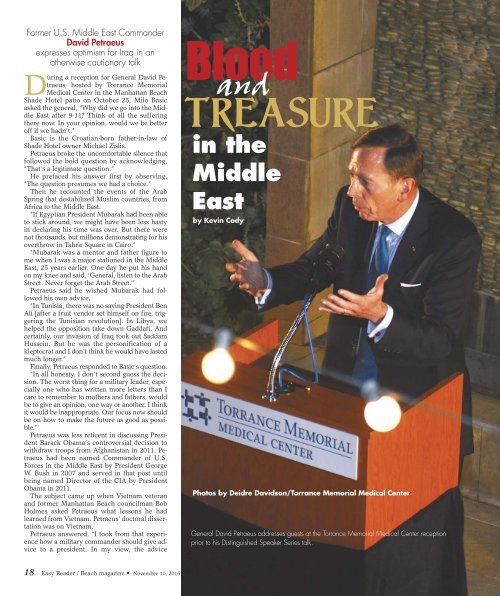Beach Nov 2016
You also want an ePaper? Increase the reach of your titles
YUMPU automatically turns print PDFs into web optimized ePapers that Google loves.
Former U.S. Middle East Commander<br />
David Petraeus<br />
expresses optimism for Iraq in an<br />
otherwise cautionary talk<br />
During a reception for General David Petraeus,<br />
hosted by Torrance Memorial<br />
Medical Center in the Manhattan <strong>Beach</strong><br />
Shade Hotel patio on October 25, Milo Basic<br />
asked the general, “Why did we go into the Middle<br />
East after 9-11? Think of all the suffering<br />
there now. In your opinion, would we be better<br />
off if we hadn’t.”<br />
Basic is the Croatian-born father-in-law of<br />
Shade Hotel owner Michael Zislis.<br />
Petraeus broke the uncomfortable silence that<br />
followed the bold question by acknowledging,<br />
“That’s a legitimate question.”<br />
He prefaced his answer first by observing,<br />
“The question presumes we had a choice.”<br />
Then he recounted the events of the Arab<br />
Spring that destabilized Muslim countries, from<br />
Africa to the Middle East.<br />
“If Egyptian President Mubarak had been able<br />
to stick around, we might have been less hasty<br />
in declaring his time was over. But there were<br />
not thousands, but millions demonstrating for his<br />
overthrow in Tahrir Square in Cairo.”<br />
“Mubarak was a mentor and father figure to<br />
me when I was a major stationed in the Middle<br />
East, 25 years earlier. One day he put his hand<br />
on my knee and said, ‘General, listen to the Arab<br />
Street. Never forget the Arab Street.’”<br />
Petraeus said he wished Mubarak had followed<br />
his own advice.<br />
“In Tunisia, there was no saving President Ben<br />
Ali [after a fruit vendor set himself on fire, triggering<br />
the Tunisian revolution]. In Libya, we<br />
helped the opposition take down Gaddafi. And<br />
certainly, our invasion of Iraq took out Saddam<br />
Hussein. But he was the personification of a<br />
kleptocrat and I don’t think he would have lasted<br />
much longer.”<br />
Finally, Petraeus responded to Basic’s question.<br />
“In all honesty, I don’t second guess the decision.<br />
The worst thing for a military leader, especially<br />
one who has written more letters than I<br />
care to remember to mothers and fathers, would<br />
be to give an opinion, one way or another. I think<br />
it would be inappropriate. Our focus now should<br />
be on how to make the future as good as possible.”<br />
Petraeus was less reticent in discussing President<br />
Barack Obama’s controversial decision to<br />
withdraw troops from Afghanistan in 2011. Petraeus<br />
had been named Commander of U.S.<br />
Forces in the Middle East by President George<br />
W. Bush in 2007 and served in that post until<br />
being named Director of the CIA by President<br />
Obama in 2011.<br />
The subject came up when Vietnam veteran<br />
and former Manhattan <strong>Beach</strong> councilman Bob<br />
Holmes asked Petraeus what lessons he had<br />
learned from Vietnam. Petraeus’ doctoral dissertation<br />
was on Vietnam.<br />
Petraeus answered, “I took from that experience<br />
how a military commander should give advice<br />
to a president. In my view, the advice<br />
Blood<br />
and<br />
treasure<br />
in the<br />
Middle<br />
East<br />
by Kevin Cody<br />
Photos by Deidre Davidson/Torrance Memorial Medical Center<br />
General David Petraeus addresses guests at the Torrance Memorial Medical Center reception<br />
prior to his Distinguished Speaker Series talk.<br />
18 Easy Reader / <strong>Beach</strong> magazine • <strong>Nov</strong>ember 10, <strong>2016</strong>

















